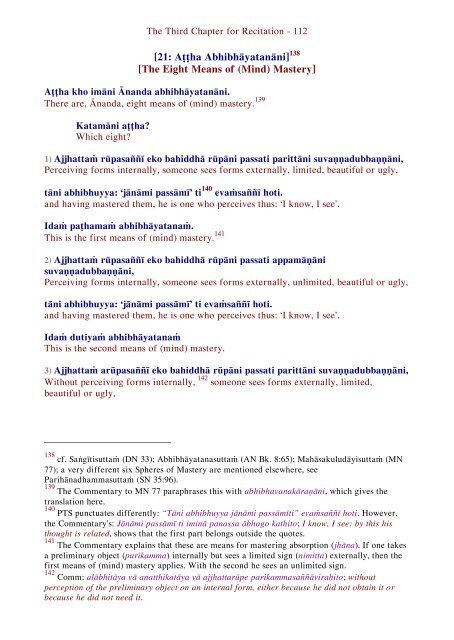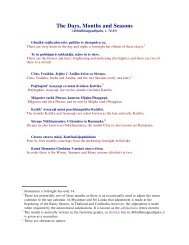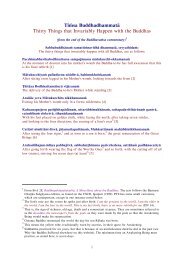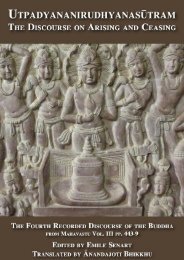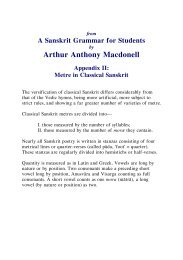Mahaparinibbanasuttam (DN 16) - Ancient Buddhist Texts
Mahaparinibbanasuttam (DN 16) - Ancient Buddhist Texts
Mahaparinibbanasuttam (DN 16) - Ancient Buddhist Texts
You also want an ePaper? Increase the reach of your titles
YUMPU automatically turns print PDFs into web optimized ePapers that Google loves.
The Third Chapter for Recitation - 112<br />
[21: Aṭṭha Abhibhāyatanāni] 138<br />
[The Eight Means of (Mind) Mastery]<br />
Aṭṭha kho imāni Ānanda abhibhāyatanāni.<br />
There are, Ānanda, eight means of (mind) mastery. 139<br />
Katamāni aṭṭha?<br />
Which eight?<br />
1) Ajjhattaṁ rūpasaññī eko bahiddhā rūpāni passati parittāni suvaṇṇadubbaṇṇāni,<br />
Perceiving forms internally, someone sees forms externally, limited, beautiful or ugly,<br />
tāni abhibhuyya: ‘jānāmi passāmī’ ti 140 evaṁsaññī hoti.<br />
and having mastered them, he is one who perceives thus: ‘I know, I see’.<br />
Idaṁ paṭhamaṁ abhibhāyatanaṁ.<br />
This is the first means of (mind) mastery. 141<br />
2) Ajjhattaṁ rūpasaññī eko bahiddhā rūpāni passati appamāṇāni<br />
suvaṇṇadubbaṇṇāni,<br />
Perceiving forms internally, someone sees forms externally, unlimited, beautiful or ugly,<br />
tāni abhibhuyya: ‘jānāmi passāmī’ ti evaṁsaññī hoti.<br />
and having mastered them, he is one who perceives thus: ‘I know, I see’.<br />
Idaṁ dutiyaṁ abhibhāyatanaṁ<br />
This is the second means of (mind) mastery.<br />
3) Ajjhattaṁ arūpasaññī eko bahiddhā rūpāni passati parittāni suvaṇṇadubbaṇṇāni,<br />
Without perceiving forms internally, 142 someone sees forms externally, limited,<br />
beautiful or ugly,<br />
138 cf. Saṅgītisuttaṁ (<strong>DN</strong> 33); Abhibhāyatanasuttaṁ (AN Bk. 8:65); Mahāsakuludāyisuttaṁ (MN<br />
77); a very different six Spheres of Mastery are mentioned elsewhere, see<br />
Parihānadhammasuttaṁ (SN 35:96).<br />
139 The Commentary to MN 77 paraphrases this with abhibhavanakāraṇāni, which gives the<br />
translation here.<br />
140 PTS punctuates differently: “Tāni abhibhuyya jānāmi passāmīti” evaṁsaññī hoti. However,<br />
the Commentary’s: Jānāmi passāmī ti iminā panassa ābhogo kathito; I know, I see: by this his<br />
thought is related, shows that the first part belongs outside the quotes.<br />
141 The Commentary explains that these are means for mastering absorption (jhāna). If one takes<br />
a preliminary object (parikamma) internally but sees a limited sign (nimitta) externally, then the<br />
first means of (mind) mastery applies. With the second he sees an unlimited sign.<br />
142 Comm: alābhitāya vā anatthikatāya vā ajjhattarūpe parikammasaññāvirahito; without<br />
perception of the preliminary object on an internal form, either because he did not obtain it or<br />
because he did not need it.


